Signs your period is coming (so you’re always prepared)
PMS-related breast changes usually resolve at the beginning or end of a person’s period. However, breast changes that occur due to pregnancy can persist throughout the pregnancy.
Signs Of Period Coming Soon: 13 Menstrual Symptoms Before Period Starts
Signs of period coming soon and pregnancy may seem alike. However, they are different.
Period, which is the cyclical bleeding from the vagina, have some signs before it starts. According to Mayo Clinic, 75 percent of women will have had some menstrual period symptoms in their lifetime.
In some women, these symptoms may be severe, affecting daily activities and requiring hospital admission.
This article explains the 13 common period signs that predict your next period.
What are the symptoms and signs of period coming soon? 
If you are expecting your period, these are some of the sign you may experience.
1. Abdominal cramps
Abdomen cramps, which is experienced by a lot of women before their period starts, is a sign your period is coming soon. Most women will experience cramps 2 – 3 days before their period starts.
However, these cramps may continue into your period and get less severe as your period ends.
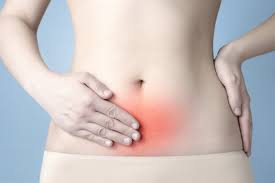
Though abdominal pain before menstruation may indicate your period will start soon, there are other causes of pre-period cramps. Pregnancy, ovulation, endometriosis and vaginal infections may mimic period like cramps
How to know if your period is coming or you’re pregnant?
If you’ve never had sex or had sexual intercourse with consistent use of a condom, it’s likely period is coming if you experience cramps days before period.
However, unprotected sexual activity weeks back can result in pregnancy-like cramps. Pregnancy cramps are very mild and due to implantation.
You can quickly confirm pregnancy by its early symptoms. Very common pregnancy symptoms are fatigue, body weakness, feeling like vomiting and light bleeding before your period.
Bonus Tip: You may be pregnant without knowing. Watch this 1-Minute-Video to Discover 16 Most common Pregnancy Signs
How to know if your period is coming or you’re ovulating?
Don’t think you are different. Some women may experience abdominal pain while ovulating. This usually occurs 2 weeks before period.
Then again, it’s possible ovulation will show up a week or days before your period. This usually occurs if you get stressed up or your hormones are unstable.
When ovulation occurs later than expected, you may also have abdominal cramps while expecting period.
Is it period or a vaginal infection?
If you persistently have low abdomen pain between periods, it may be due to vaginal infections or endometriosis.
How can I ease cramps before my period?
- Have regular exercise
- Reduce the amount of sugar intake
- Take pain relief medications to help with your cramps
2. Change of mood 
Are you experiencing a change in your behavior before your period? Do you feel you’re getting very emotional before your period?
Having increased emotions before period is a sign your period is coming soon. Mood changes that occur after ovulation is a sign your period will start soon.
If you are persistently having mood changes throughout your menstrual cycle, then it may be due to other causes. You should inform your doctor.
Other causes of mood changes are
- Drug abuse
- Hormone imbalance
- Depression
- Epilepsy
3. Acne on face 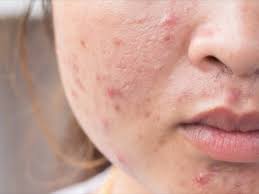
Do you notice increased acne breakout before periods? During the menstrual cycle and at puberty, hormone changes cause women to start having acne.
Acne occurs due to increased androgen in your body. These androgens will cause follicular glands to grow more with more sebum production.
If you are experienced acne before your period, your period may be starting in a few days.
What to do?
Acne can be embarrassing sometimes for women. However, these are some simple steps to get rid of acne.
- Don’t let your face oily. Clean and wash your face at least twice a day
- Use proven products to help remove your acne
- If it gets serious, you can let your doctor know about your symptoms
4. Breast pain and swelling 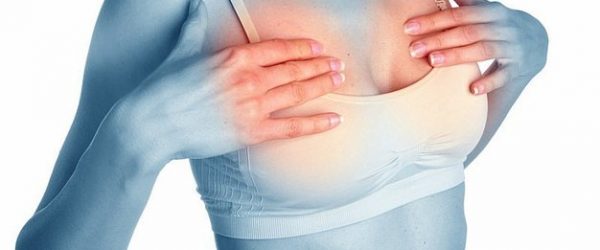
Do you experience increased pain in your breast before your period starts? Do you notice your breasts are slightly larger before your period?
Before period, some women may experience breast pain and swelling. This is a sign of period coming soon. Some women may have a lump in their breast that disappears after period starts.
Changes in the breast before your period is due to the effect of hormones. Hormones — Estrogen and progesterone, will cause your ducts to enlarge and your glands to swell.
In women with a 28-day menstrual cycle, breast tenderness usually occurs 4 days before period (Or 10 days after ovulation).
What to do?
- Drugs like ibuprofen and naproxen can ease your breast pain
- If your breast pain is persistent, you should talk to your doctor
5. Abdominal bloating, gas and pain 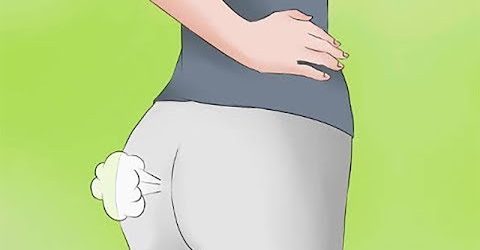
Do you feel your abdomen is swelling up just before period?
Abdomen bloating is swelling and tightening experienced by women which could occur for many reasons. If you are expecting your period, a hard, distended and tight abdomen may indicate your period will start soon.
Other causes of bloating are pregnancy, anorexia nervosa (severe weight loss), ovarian cyst and hormone imbalance.
What to do?
- Have regular exercise
- Reduce salt intake as this may worsen your fluid retention
- Reduce sugar intake
- Take more fiber diet like vegetables and fruits
- Drink plenty of water every day
- Avoid meals that contain beans and cabbage

6. Headache 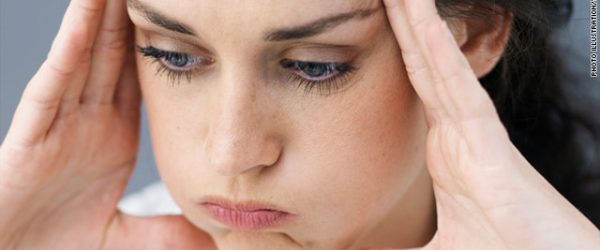
Are you having a headache days before your period starts?
Headache before menstrual period occurs due to drop in your body’s estrogen level and may be severe sometimes. It usually occurs 1 – 3 days before your next period.
However, headache may indicate many other problems. If you are having headache throughout your menstrual cycle, then it not a period symptom. You should inform your doctor to determine the cause.
What can I do to ease my headache?
- Painkillers like ibuprofen and diclofenac could help reduce menstrual cramps and headache
- Estrogen supplements before and during period may help ameliorate symptoms
- Combined oral contraceptive pills
- Notify your doctor if it gets worse
7. Sleepless nights before period
Are you experience sleepless night (insomnia) before your period starts? Then your period may just be close by.
Sleepless night 1 – 3 days before your expected period is a sign of period coming. Insomnia occurs due to reduced estrogen and progesterone hormones before period.
What to do?
- Reduce stress
- Exercise regularly
- Chart your sleeping patterns
- Inform your doctor about your symptoms
Other symptoms of period coming are
8. Fatigue
9. Food cravings
10. Hot flashes
11. Poor concentration before period
12. Confusion
13. Back pain before period
FAQs about menstrual period symptoms and signs
These are some commonly asked questions that may concern you.
1. What are signs of period coming discharge? 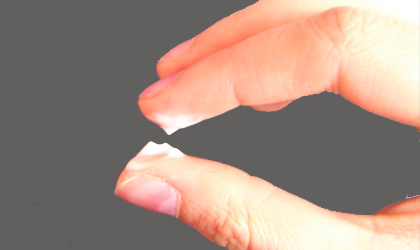
Vaginal discharge before period is thick white discharge.
During your menstrual cycle, your vaginal discharge may change from time to time. At the beginning of your cycle, after menstruation ends, vaginal discharge is thick white. Some women may experience vaginal dryness just after period ends.
At the middle of your cycle or just before ovulation occurs, vaginal discharge becomes stretchy and egg white. After ovulation occurs and before your period, vaginal discharge is thick white again.
Changes in vaginal discharge are due to hormone changes during menstrual cycles. Thick white discharge is a sign your period is coming. It occurs due to low levels of progesterone and estrogen.
2. What are the signs your period is coming tomorrow (next day)?
- Headache
- Sleepless night
- Pelvic pain
- Acne
- Changes in appetite
- Mood change
- Confusion and lack of concentration
- Abdominal bloating
- Breast pain
- Breast swelling
3. Signs of period coming but no period
If you experience signs of period coming but no period, then it may be due to pregnancy.
Pregnancy may cause you to have signs of period —Headache and cramps, but no period coming.
If pregnant, you may experience brown spotting before period or sometimes an unusual early light period.
Are you getting tired easily? Do you feel like vomiting? Are you craving for a specific kind of diet? Then it’s possible you may be pregnant.
Other causes of signs of period coming but no period are stress, weight loss, contraceptive pills, obesity, weight loss, ovarian cyst and polycystic ovarian disease.
4. What causes menstrual period to come out?
Period occurs due to cyclical change of your hormones during your menstrual cycle.
What is the menstrual cycle?
The menstrual cycle is the number of days between 2 periods. For example, if your last menstrual period started on the 27th of April and your next period starts on the 26th of May, then you have a 30-day menstrual cycle.
Some women may have an erratic menstrual cycle, short menstrual cycle or long menstrual cycle.
What causes period to come out?
At birth and during puberty, the ovaries contain a fixed number of follicles that are released in each cycle. Weeks before you are born, your body stops producing follicle that develops to release an egg.
It is estimated that throughout the lifetime of women, about 500 eggs are released from the ovaries. These release of the egg is called ovulation.
Before ovulation occurs, your body increases the secretion of estrogen. This hormone works to help grow the endometrium covering the inner part of the uterus.
If you get pregnant, you will have no period because the endometrium helps provide nutrition for your baby.
However, if you’re not pregnant, the endometrium breaks down coming out from your vagina as period.
Now it’s your turn. Do you have a headache or pains before your period starts? Are your menstrual period symptoms affecting your daily activities?
Table of Contents
Dr. Dunn A. (M.B.B.S) – Written or Reviewed
Dr. Akatakpo Dunn is a senior medical officer at the Presbyterian Joint hospital. He has done over 100 c-section and supervised the delivery of over 300 babies. He currently trains Comunity health extension workers (CHEW) in rural communities in Nigeria. With lots of crap online, I Hope to quickly give reliable information about health. Read more About Dr. Dunn A. A
9 Comments
- Akana August 11, 2017 at 6:14 pm Reply Tiredness, sleep less, craving, back and waste pain when working, swollen and painful breast. White egg discharge, feeling like spitting.
- Grace September 12, 2017 at 10:00 pm Reply I took p2 after my last period and after two weeks I took another dose of p2 after 3 days I started feeling some pain on my abdomen and lower back. Could I be experiencing implantation?
- Koketso September 17, 2017 at 5:48 am Reply OK Doc I have a 28 cycle so I slept with my bf a week after I have ovulated..so I was supposed to have my period on the 11 So I didn’t.. but I experience all those kind of symptoms like breast tenderness, acne on the forehead,food cravings,too much appetite and pain on pelvis for about a week now.. So could u be pregnant
- Dr. Dunn A. September 17, 2017 at 7:27 am Reply Your menstrual cycle is 28 days and regular Your last menstrual period is 15 day of August You are sure you experienced ovulation signs ( not sure read this guide) You are experiencing symptoms that look like period but mimic pregnancy and your period is one week late If you’ve missed your period by a week, I advise you take a pregnancy test right away. However, a delayed period may occur if your ovulation is delayed. This guide explains why its almost 2 weeks and you have no period (It may not be pregnancy)
Signs your period is coming (so you’re always prepared)
The body works in mysterious ways to alert you that your period is coming. We dive into some of the different signs so you’re never caught off guard.
Medically reviewed by
Dr. Jennifer Boyle
Obstetrician and gynecologist, Massachusetts General Hospital, Massachusetts, US
Updated November 23 2022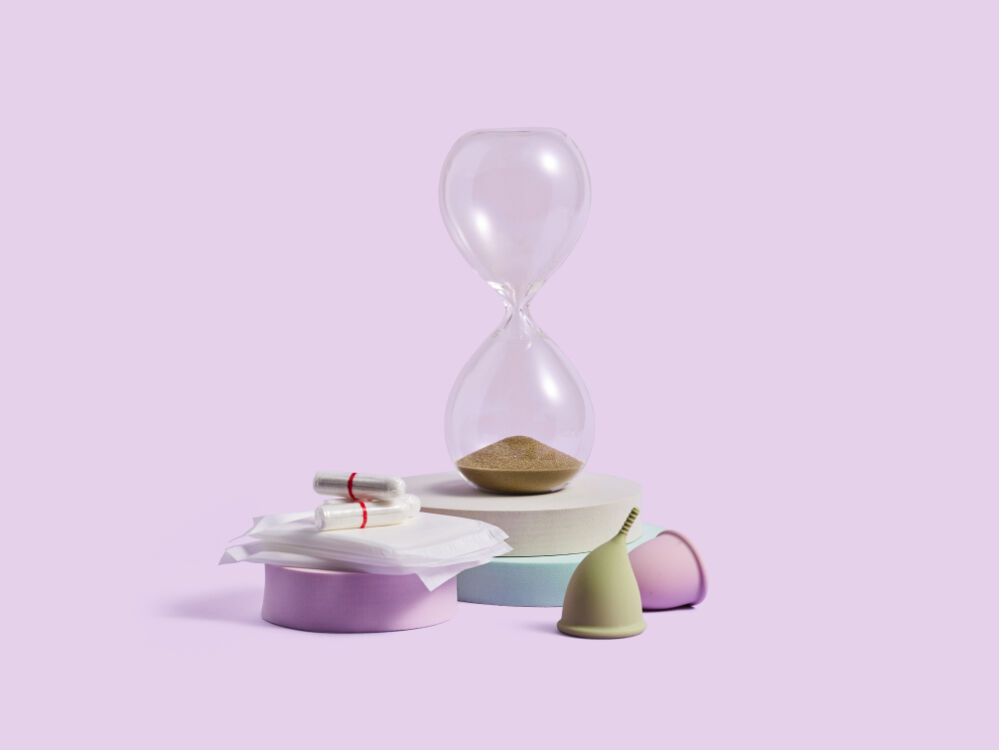
Written by Karen Gordon
Even less fun than your actual period is the week or two of symptoms that many of us experience leading up to it. “Premenstrual syndrome,” which most of us know as PMS, is very common. In fact, nearly half of women experience PMS at some point in their lifetime. And while it looks different in everyone, PMS is thought to be caused by the same thing: fluctuating hormone levels throughout the menstrual cycle.
The signs your period is coming aren’t the same for every person, and they can even change for an individual from month to month. For some, PMS symptoms are a minor annoyance, but for others, they can be debilitating.
You can always use Flo’s online period calculator to get an idea of when your next period might be due, but it’s also worth delving into some of the physical signs your period may be on its way. That way, you know what to look out for so you don’t get caught short without your menstrual product of choice.
Take a quiz
Find out what you can do with our Health Assistant
Track my period

Get pregnant
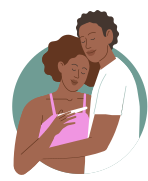
Follow my baby’s growth
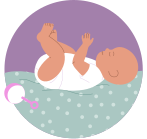
What is PMS?
Knowing the signs your period is coming can help you handle your menstrual symptoms better. But first up: Why do we get PMS? According to the American College of Obstetricians and Gynecologists, PMS is a pattern of emotional and physical symptoms that happen regularly (at least three menstrual cycles in a row), interfere with a person’s normal life, strike in the 5 days before, and end within 4 days after a period starts.
“Estrogen and progesterone are hormones that help control our menstrual cycle,” explains Amanda Kallen, MD, associate professor at Yale University School of Medicine of Reproductive Endocrinology and Infertility and Flo Medical Board expert. “These hormones fluctuate throughout a menstrual cycle: Estrogen is the dominant hormone before ovulation [your fertile window], and progesterone is dominant after ovulation [the days before your period starts]. This changing balance of hormones can contribute to PMS symptoms,” she explains.
What are the signs your period is coming?
Let’s take a look at the common signs of PMS, which can be a clear indicator that your period is about to arrive.
1. Your skin is breaking out
Ever noticed how your skin is most breakout prone on the days you’re due? Yeah, it can be really annoying. But if solidarity helps you with this kind of thing, it might be useful to know that more than 50% of women say their acne symptoms get worse in the week before their period.
“The rise in progesterone before a period can contribute to skin breakouts because it increases your skin’s production of sebum (oil) production,” explains Dr. Kallen.
2. Your breasts feel tender
It’s common for breasts to feel extra sensitive, or even sore, on the days leading up to a period. “Breasts can feel sore and swollen due to the fluctuating levels of hormones,” explains Dr. Kallen. Why? “Estrogen enlarges breast ducts, and progesterone causes milk glands to swell. Both combined can make your breasts feel pretty tender.”
Remember, it’s important to get to know how your breasts normally look and feel. Ideally, examine them in the days after your period ends, when your breasts are least likely to be swollen and tender. Bear in mind that breast tenderness before your period is normal, but if you have other concerns about your breasts or notice a change, you should see a health care professional.
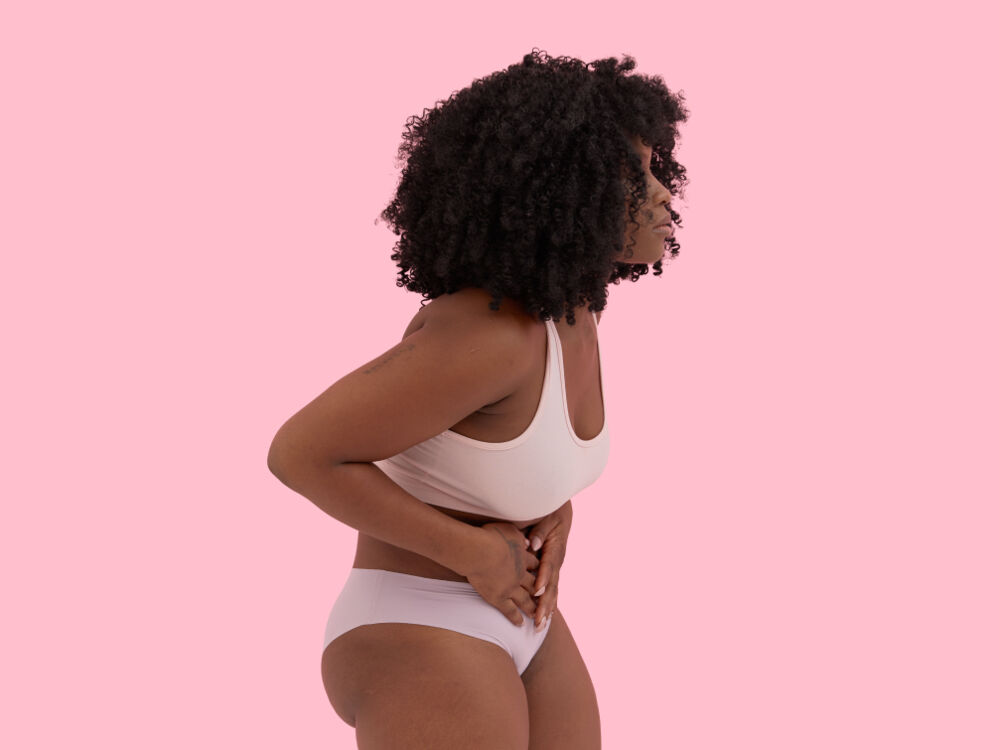
3. You have menstrual cramps
Looking for signs your period is coming tomorrow? Menstrual cramps are a pretty good indicator. “Period-related stomach cramps are most likely caused by prostaglandins, hormone-like substances that tell your uterine muscles to contract (resulting in the shedding of the uterus lining) during your period,” Dr. Kallen explains. “Sometimes, those contracting muscles can create pain that radiates to your lower back.”
Some people are more likely than others to experience these kinds of symptoms in the lead up to their period. One study on more than 3,000 women, published in the Journal of Women’s Health, found that those with higher levels of inflammation in the body during their monthly flow were more likely to experience cramps and back pain.
But don’t always dismiss cramping as something that’s just part and parcel of having a period. If you’re experiencing pain that stops you from going about your day, speak to a health care professional. They can help you find ways to feel better and make sure the pain is not due to any other problem. “Severe lower back pain and cramping may even be associated with an underlying health condition, like endometriosis or uterine fibroids,” says Dr. Kallen.
4. You’re having mood swings
Ever find that you go from angry outbursts to anxiety attacks, then back to feeling emotionally stable — all in one day? If you notice your emotions are more intense than normal, this could also be a sign that your period is coming soon.
Emotional symptoms are thought to be connected to the rise and fall of hormones — particularly the dip in estrogen, which can make us feel low and irritable. “Some people may also be more susceptible to PMS due to underlying mood conditions or genetic factors,” says Dr. Kallen.
But if your PMS symptoms are intense and interfere with your daily life, it may be a sign of premenstrual dysphoric disorder (PMDD), a severe form of PMS. This often manifests in the form of anxiety or depression around the time of your period, and you can read more about the differences between PMS and PMDD here.
5. You feel bloated
Bloating is a completely normal, and admittedly uncomfortable, period symptom. “Bloating is triggered by fluctuating hormones — for instance, high levels of progesterone can slow the digestive tract, leading to constipation and bloating,” says Dr. Kallen. “Water retention may also be connected to changes in your diet around the time of your period, when you’re more likely to crave salty or sweet foods.”
If your bloating symptoms persist even after your period has come and gone, it’s important to speak to a health care professional so they can rule out anything serious.
6. You’re super tired
If you’re feeling drained of energy and not sleeping well before your period starts, you’re definitely not alone. “Shifting hormones in the days before your period, as well as changes in your brain chemicals, can affect both your mood and sleep,” Dr. Kallen explains, noting that levels of serotonin, a brain chemical that affects mood, often decline along with falling estrogen levels.
Tiredness is also an early pregnancy sign due to high levels of progesterone — which plays a significant role in the first trimester as well as the second half of the menstrual cycle. And actually, many signs of early pregnancy — including cramping, mood swings, breast tenderness, and exhaustion — mimic the symptoms you typically experience before a period. “If there’s any chance of pregnancy, take a pregnancy test after a missed period,” Dr. Kallen says.
7. Your discharge is dry
Vaginal discharge changes during different parts of your cycle — and is often a good telltale sign of the most fertile time in your cycle. “Around ovulation, your cervix produces more cervical mucus, and your discharge may have a raw egg white texture to increase the chances of conception,” explains Dr. Kallen. But right before your period, it generally looks different. “You’ll have no discharge at all, or it may be sticky because this is when you’re least fertile.”
Signs your period is coming: The takeaway
Everybody’s experience of PMS symptoms is unique. And let’s be honest: Managing PMS is not exactly a walk in the park. The good news is that most PMS symptoms should start to taper off as your period starts.
Tracking your cycle in Flo can be a useful tool for gathering information you can pass on to a doctor for a PMS or a PMDD diagnosis. It’s also a great way to gain more control over your cycle. It helps you understand when your next period is coming and enables you to understand what factors — like a lack of sleep or drinking too much coffee — may intensify PMS symptoms. Recognizing the signs can help you (mentally and physically) prepare for your next period, and it can allow you more time to listen to your body and practice a bit more self-care.
References
Barth, Claudia, et al. “Sex Hormones Affect Neurotransmitters and Shape the Adult Female Brain during Hormonal Transition Periods.” Frontiers in Neuroscience, vol. 9, 2015. Crossref, https://doi.org/10.3389/fnins.2015.00037. Accessed 28 Feb. 2022.
Gold, Ellen B., et al. “The Association of Inflammation with Premenstrual Symptoms.” Journal of Women’s Health, vol. 25, no. 9, Sep. 2016, pp. 865–74.
Hofmeister, Sabrina and Seth Bodden. “Premenstrual Syndrome and Premenstrual Dysphoric Disorder.” American Family Physician, vol. 94, no. 3, 1 Aug. 2016, pp. 236–240, www.aafp.org/afp/2016/0801/p236.html. Accessed 28 Feb. 2022.
Lucky, Anne W. “Quantitative Documentation of a Premenstrual Flare of Facial Acne in Adult Women.” Archives of Dermatology, vol. 140, no. 4, 2004. Crossref, https://doi.org/10.1001/archderm.140.4.423. Accessed 28 Feb. 2022.
Sattar, Kaikhavandi. “Epidemiology of Premenstrual Syndrome, A Systematic Review and Meta-Analysis Study.” Journal of Clinical and Diagnostic Research, vol. 8, no. 2, 2014. Crossref, https://doi.org/10.7860/jcdr/2014/8024.4021. Accessed 28 Feb. 2022.
Watson, Jessica, et al. “Use of Multiple Inflammatory Marker Tests in Primary Care: Using Clinical Practice Research Datalink to Evaluate Accuracy.” British Journal of General Practice, vol. 69, no. 684, Jul. 2019, pp. e462–e469. Accessed 14 Feb. 2022.
Yonkers, Kimberly Ann, et al. “Premenstrual Syndrome.” The Lancet, vol. 371, no. 9619, Apr. 2008, pp. 1200–10.
How to tell that a period is coming
There are several ways a person can tell when a period is due. Many people experience a range of physical and emotional symptoms, known as premenstrual syndrome (PMS), as their hormone levels drop.
This article discusses how to tell when a period is coming and possible reasons for having period symptoms with no period. It also compares PMS to early pregnancy symptoms.

Many people experience PMS before their period starts. This can act as a sign that a period is on the way. Some of the physical symptoms of PMS include:
- abdominal bloating
- abdominal cramping
- tender or swollen breasts
- back pain
- changes in appetite
- pimples or acne
- sleeping more or less than usual
- headaches
- sensitivity to light or sound
- vaginal discharge becoming dry, sticky, or absent
Emotional symptoms of PMS may include:
- irritability
- anxiety
- fatigue
- food cravings
- difficulty concentrating
- feelings of sadness or apathy
- crying spells or angry outbursts
- reduced sex drive
Does everyone get PMS?
PMS does not affect everyone in the same way. Some people have their period with no PMS or only a few mild symptoms, whereas other people experience severe symptoms that interfere with their daily activities. Severe PMS is known as premenstrual dysphoric disorder (PMDD).
PMS symptoms can also change throughout a person’s life. People may notice different PMS symptoms as they get older or after their first pregnancy.
How long does PMS last?
According to the Office on Women’s Health , PMS symptoms often begin around 5 days before a period and usually resolve once the body’s estrogen and progesterone levels start rising. This typically occurs about 4 days after a person’s period begins.
PMS occurs after ovulation, which is when an ovary releases an egg into a fallopian tube. After this point in the menstrual cycle, estrogen and progesterone levels decrease significantly . Researchers believe this is what causes PMS symptoms.
If someone has PMS-like symptoms but their period does not arrive when they expect it to, there are several potential explanations, such as:
- Irregular periods: It is common for periods not to begin at the same time in each cycle. If the length of someone’s cycle varies widely from month to month or they have a very long cycle, they may have irregular periods. Irregularity is typical for people going through puberty or perimenopause, but it can have other causes.
- Stress: Psychological stress causes a range of physical and emotional symptoms. It may make someone feel anxious, overwhelmed, or more emotional than usual. It can also cause aches and pains, tiredness, changes to digestion, and a low sex drive.
- Hormonal birth control: Contraceptive pills, patches, implants, and intrauterine devices can cause side effects that resemble PMS. However, some people stop having a monthly bleed while they use these forms of birth control.
- Physical conditions: Some health conditions cause PMS-like symptoms. Some examples include polycystic ovary syndrome (PCOS), certain nutritional deficiencies, and thyroid disease.
- Pregnancy: Early pregnancy has similar symptoms to PMS and results in periods stopping. If pregnancy is a possibility, seek testing.
PMS and early pregnancy can cause similar symptoms. Here is a comparison.
Bleeding or spotting
Although bleeding does not typically occur during PMS, some people experience light bleeding or spotting. This can also be a sign of early pregnancy.
Nearly 15–25% of pregnant people report spotting or light bleeding during the first trimester. When this occurs 1–2 weeks after a fertilized egg implants in the uterine lining, it is usually called implantation bleeding.
Implantation bleeding is much lighter than menstrual bleeding. It may look like a pale pink or brown discharge, whereas menstrual blood appears bright red.
Abdominal pain or cramping
Both PMS and pregnancy can cause abdominal pain. People may also notice mild-to-moderate cramping in the lower abdomen.
During pregnancy, these cramps feel similar to premenstrual cramps, and they occur as the embryo grows and stretches the uterus.
Breast changes
Both PMS and pregnancy affect hormone levels, which may result in breast changes, such as:
- pain
- tenderness or sensitivity
- swelling
- heaviness
PMS-related breast changes usually resolve at the beginning or end of a person’s period. However, breast changes that occur due to pregnancy can persist throughout the pregnancy.
Fatigue
Fatigue is a potential symptom of both PMS and early pregnancy. Fatigue during pregnancy might be due to elevated hormone levels. An imbalance of the neurotransmitter serotonin may contribute to feelings of fatigue during PMS.
Serotonin helps regulate mood and the body’s sleep cycle, and its levels change throughout a person’s menstrual cycle. These changes may affect some people more than others.
Changes in mood
The hormonal changes that occur during menstruation and pregnancy can affect a person’s mood, leaving them feeling anxious, sad, or irritable. Persistent feelings of sadness, apathy, or irritability that last longer than 2 weeks may indicate depression or another mood disorder. Dramatic mood changes that only occur before a period may be a sign of PMDD.
The symptoms of PMDD are similar to PMS but much more intense. They include:
- persistent irritability
- symptoms of depression and anxiety
- panic attacks
- mood swings
- difficulty falling asleep
- severe daytime fatigue
- food cravings
- binge eating
- headaches
- bloating
- cramps
- joint and muscle pain
People may wish to see a healthcare professional if they have PMS symptoms that affect their daily life, if the symptoms occur outside of their period, or if they experience any sudden or dramatic changes to PMS or period symptoms.
If a person expects to have a period, but it does not arrive, it is best to speak with a healthcare professional about the potential causes. They may recommend a pregnancy test if someone could be pregnant or other tests if pregnancy is not the cause.
Heavy bleeding and severe abdominal cramping can indicate pregnancy complications, such as pregnancy loss or ectopic pregnancy. Contact a provider immediately if a pregnant person experiences any of the following symptoms:
- heavy bleeding
- intense lower back pain
- painful abdominal cramps
- a sudden, intense headache
- severe, persistent fatigue
- difficulty breathing
- vomiting numerous times a day
Several symptoms can inform someone if they are about to have a period and can include spotting, pain or cramping, bloating, swollen or tender breasts, acne, and mood changes.
PMS usually appears the week before and goes away a few days after a period begins. Although these symptoms can cause discomfort, they should not interfere with a person’s daily life.
If someone has severe PMS or symptoms that occur with no period, they should speak with a medical provider.
Last medically reviewed on November 9, 2021
- Pregnancy / Obstetrics
- Women’s Health / Gynecology
How we reviewed this article:
Medical News Today has strict sourcing guidelines and draws only from peer-reviewed studies, academic research institutions, and medical journals and associations. We avoid using tertiary references. We link primary sources — including studies, scientific references, and statistics — within each article and also list them in the resources section at the bottom of our articles. You can learn more about how we ensure our content is accurate and current by reading our editorial policy.
- Bai, G., et al. (2016). Associations between nausea, vomiting, fatigue and health-related quality of life of women in early pregnancy: The generation R study.
https://www.ncbi.nlm.nih.gov/pmc/articles/PMC5096665/ - Bleeding during pregnancy. (2019).
https://www.acog.org/Patients/FAQs/Bleeding-During-Pregnancy - Body changes and discomforts. (2019).
https://www.womenshealth.gov/pregnancy/youre-pregnant-now-what/body-changes-and-discomforts - Depression. (2018).
https://www.nimh.nih.gov/health/topics/depression/index.shtml - Period problems. (2018).
https://www.womenshealth.gov/menstrual-cycle/period-problems - Premenstrual dysphoric disorder (PMDD). (2018).
https://www.womenshealth.gov/menstrual-cycle/premenstrual-syndrome/premenstrual-dysphoric-disorder-pmdd - Premenstrual syndrome (PMS). (2018).
https://www.womenshealth.gov/menstrual-cycle/premenstrual-syndrome - What are some common signs of pregnancy? (2017).
https://www.nichd.nih.gov/health/topics/pregnancy/conditioninfo/signs






